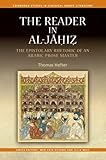The Reader in al-Jahiz : The Epistolary Rhetoric of an Arabic Prose Master / Thomas Hefter.
Material type: TextSeries: Edinburgh Studies in Classical Arabic Literature : ESCALPublisher: Edinburgh : Edinburgh University Press, [2022]Copyright date: ©2014Description: 1 online resource (288 p.)Content type:
TextSeries: Edinburgh Studies in Classical Arabic Literature : ESCALPublisher: Edinburgh : Edinburgh University Press, [2022]Copyright date: ©2014Description: 1 online resource (288 p.)Content type: - 9780748692743
- 9780748692750
- 306.09 22/ger
- online - DeGruyter
- Issued also in print.
| Item type | Current library | Call number | URL | Status | Notes | Barcode | |
|---|---|---|---|---|---|---|---|
 eBook
eBook
|
Biblioteca "Angelicum" Pont. Univ. S.Tommaso d'Aquino Nuvola online | online - DeGruyter (Browse shelf(Opens below)) | Online access | Not for loan (Accesso limitato) | Accesso per gli utenti autorizzati / Access for authorized users | (dgr)9780748692750 |
Frontmatter -- Contents -- Acknowledgements -- Introduction -- 1. The Addressee and the Occasion of Writing -- 2. Epistolary Confrontations and Dialectics of Parody -- 3. Undisclosed Origins and Homelands -- 4. Faulting Misers in the Introduction to Kitāb al-Bukhalāʾ -- 5. Passive Addressee and Critical Reader in the Abū al-ʿĀṣ/Ibn al-Tawʾam Debate -- Conclusion -- Bibliography -- Index
restricted access online access with authorization star
http://purl.org/coar/access_right/c_16ec
Explores the intricately crafted rhetorical strategies used by al-Jāḥiẓ in his lettersGBS_insertPreviewButtonPopup(['ISBN:9780748692743','ISBN:9780748692750']);The 9th-century essayist, theologian and encyclopaedist 'Amr b. Baḥr al-Jāḥiẓ has long been acknowledged as a master of early Arabic prose writing. Many of his most engaging writings were clearly intended for a broad readership but were presented as letters to individuals. Despite the importance and quantity of these letters, surprisingly little academic notice has been paid to them.Now, Thomas Hefter takes a new approach in interpreting some of al-Jāḥiẓ's 'epistolary monographs'. By focussing on the varying ways in which he wrote to the addressee, Hefter shows how al-Jāḥiẓ shaped his conversations on the page in order to guide (or manipulate) his actual readers and encourage them to engage with his complex materials.Key FeaturesLooks at letters from one of the most unique minds of the Abbasid era that cover sectarian and ethnic rivalries, ethical questions, intoxicating beverages and daily lifeRelates al-Jāḥiẓ's experiments with the letter frame to his views on occupations, human geography and other issues of his dayExamines the role of self-parody in al-Jāḥiẓ's fictional conversations with his addresseesExplores the rich interplay of contending voices"
Issued also in print.
Mode of access: Internet via World Wide Web.
In English.
Description based on online resource; title from PDF title page (publisher's Web site, viewed 24. Mai 2022)


